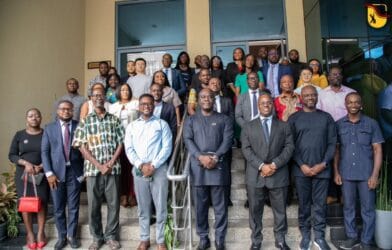Accra, March 26, 2025 – The Ghana Chamber of Mines has reaffirmed its commitment to working with the government to find sustainable solutions to mitigate the impact of the proposed increase in the Growth and Sustainability Levy (GSL) from 1% to 3%.
Addressing the media in Accra, the Chamber’s Director of External Affairs and Communications, Mr. Ahmed Dassana, clarified that the GSL increase disproportionately affects manganese and bauxite producers, even though these minerals have not benefitted from the recent surge in gold prices. He noted that this disparity creates an uneven financial burden within the mining sector.
His comments come in response to ongoing public discussions, particularly a recent press release by the Institute of Economic Affairs (IEA) titled Maximizing the Benefits from Ghana’s Natural Resources.
The justification for increasing the GSL, he explained, is based on claims that Ghana has not fully captured the economic rent from its natural resources, with recent gold price surges significantly boosting sector gains.
However, he cited reports indicating that extractive sector rents account for 14% of GDP, while extractive sector revenue contributes only 1.5% of GDP.
He further referenced World Bank data, which shows that the ratio of mineral rent to GDP in Ghana ranged from 2.4% in 2015 to 5.2% in 2021, averaging below 3% between 1990 and 2021.
Mr. Dassana emphasized that the Chamber has consistently raised concerns about the levy since its introduction and maintains its position following the rate hike.
He drew lessons from Ghana’s mining history, recalling how government control over mining operations under the State Gold Mining Corporation (SGMC) in the 1960s and 1970s led to severe financial and operational challenges.
This, he said, resulted in a 60% decline in national mineral production and a 45% drop in mining employment between 1970 and 1982, which significantly contributed to Ghana’s economic downturn in the 1980s.
To ensure sustainable mining practices, the Chamber has urged large-scale mining firms, particularly those already partly or fully owned by Ghanaians or state agencies, to further promote local participation in the industry.
It also reiterated its support for increased funding for the Ghana Geological Survey Authority (GSA) to facilitate comprehensive resource assessments.
Enhanced funding would help de-risk Ghana’s mineral deposits and position the state for independent development or strategic partnerships, Mr. Dassana stated.
The Chamber also commended the government’s ongoing efforts to combat illegal mining, particularly initiatives aimed at protecting Ghana’s forests and water bodies.
Furthermore, it renewed its call for a legislative framework for the management of mineral revenues, similar to the Petroleum Revenue Management Act.
The Chamber believes such a policy would enhance transparency and accountability while reinforcing the mining sector’s critical role in national development.
The Ghana Chamber of Mines reaffirmed its commitment to working collaboratively with all stakeholders to ensure that Ghana maximizes its mineral resources for the benefit of all citizens.
Report By: Tahidu Abdul Jalil







